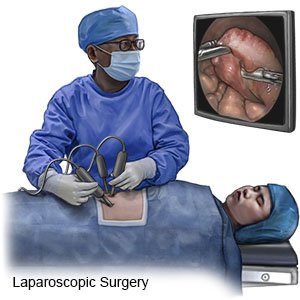Laparoscopic Colostomy Reversal
Medically reviewed by Drugs.com. Last updated on Jul 7, 2024.
AMBULATORY CARE:
Laparoscopic colostomy reversal
is surgery to remove your stoma and reconnect your colon. It is also called a colostomy takedown.
How to prepare for your surgery:
- You may need tests to help your surgeon find any problems with your intestines. The tests may include a barium enema.
- Your surgeon may tell you to only eat and drink clear liquids for 2 days before your surgery. This helps to begin cleaning out your intestines for surgery.
- You may need to be admitted to the hospital the night before your surgery. Healthcare providers may give you medicine or an enema to make sure your intestines are empty.
- If you are not admitted, you will be told not to eat or drink anything after midnight the night before your surgery. Tell your surgeon about all your current medicines. He or she will tell you if you need to stop any medicine for surgery, and when to stop. He or she will tell you which medicines to take or not take the day of your surgery.
What will happen during your surgery:
- You will be given general anesthesia to keep you asleep and pain-free during your surgery. You will be given antibiotics before your surgery to prevent an infection. You may also be given antibiotics during and after your surgery.
- Your surgeon will make several small incisions to place the scope and small tools through to complete the surgery. Your surgeon will cut your stoma away from your abdomen. He or she may need to use a gas to move other organs out of the way. Your surgeon will sew or staple the ends of your colon together, then check for leaks.

- The openings in your abdomen will be sewn or stapled shut. Your surgeon may need to leave part of the area open to allow it to heal from the inside out. A bandage will be placed over the area. Steristrips will be placed over the incisions.
What to expect after your surgery:
- You will be monitored until you are fully awake, then taken to your hospital room.
- You will not be able to eat or drink until you pass gas or have a bowel movement.
- You may need a tube placed in your nose and guided to your stomach if you vomit and have nausea. The tube will remove anything in your stomach. It is removed after your bowels start working.
- Healthcare providers will help you get up and walk after surgery. When you walk, it helps prevent blood clots and also helps your bowels to start working.
Risks of laparoscopic colostomy reversal:
You may bleed more than expected during or after your surgery. You may have problems that require open surgery. Your surgeon may not be able to reconnect your colon. If this happens, you will need to keep your colostomy. Your colon may leak or pull apart around the area where it was put back together. This can cause a serious infection that can become life-threatening. You may develop a blood clot in your leg or arm. The blood clot can break loose and travel to your brain or lungs. This can be life-threatening.
Call your local emergency number (911 in the US) if:
- You suddenly feel lightheaded and short of breath.
- You have chest pain when you take a deep breath or cough. You may cough up blood.
Seek care immediately if:
- You have severe pain in your abdomen.
- Your abdomen becomes swollen and hard.
- Your vomit or bowel movements are black or have blood in them.
- Your arm or leg feels warm, tender, and painful. It may look swollen and red.
Call your surgeon or doctor if:
- You have a fever of 101ºF (38.3ºC) or higher.
- You are not able to have a bowel movement for 3 days.
- You have nausea or are vomiting.
- Blood soaks through your bandage.
- Your surgery area is red, warm, swollen, or draining pus.
- You have questions or concerns about your condition or care.
Care for the surgery area as directed:
Check the area for signs of infection daily. Signs of infection include redness, swelling, foul smell, pain, or pus. Change your bandage if it gets wet or dirty and as directed by your healthcare provider. The steristrips will fall off on their own in about 3 weeks.
Self-care:
- Use adult incontinence briefs. As your bowel function gets back to normal, you may have accidents. Your bowel movements may be more liquid.
- You may need a barrier cream to keep your anus from getting irritated from wiping. Clean your anus with warm water after each bowel movement. Reapply barrier cream after cleaning. Do not use baby wipes or powder. These can cause more irritation.
- Do not lift more than 10 pounds for 4 weeks or as directed. Do not bend or twist. This will help your surgery area heal and decrease your risk for a hernia.
- Do not drive until your healthcare provider says it is okay.
Do not smoke:
Nicotine and other chemicals in cigarettes and cigars can cause blood vessel damage. Blood vessel damage can keep your surgery area from healing properly. Ask your healthcare provider for information if you currently smoke and need help to quit. E-cigarettes or smokeless tobacco still contain nicotine. Talk to your healthcare provider before you use these products.
Nutrition after surgery:
- Do not eat late at night. You may have bowel movements through the night. Your digestive system needs time to work properly.
- Eat a variety of high-fiber foods to prevent constipation. High-fiber foods include cooked beans, fruits, vegetables, and some cereals. Ask your healthcare provider how much fiber you should have.

- Avoid or limit foods that can irritate your digestive system. These foods include spicy and fatty foods, and citrus fruits, such as lemons and oranges. Also avoid foods that cause gas, such as broccoli, cabbage, and cauliflower. Beans, eggs, and fish may also cause gas. Limit alcohol and carbonated drinks, such as soft drinks.
- Drink liquids as directed to prevent constipation. Ask your healthcare provider how much liquid to drink each day and which liquids are best for you.
- Exercise regularly. Exercise helps move bowel movements through your colon. It also helps prevent blood clots. Ask your healthcare provider about the best exercise plan for you.

Follow up with your surgeon as directed:
You may need more tests to make sure your colon is healing properly. Write down your questions so you remember to ask them during your visits.
© Copyright Merative 2024 Information is for End User's use only and may not be sold, redistributed or otherwise used for commercial purposes.
The above information is an educational aid only. It is not intended as medical advice for individual conditions or treatments. Talk to your doctor, nurse or pharmacist before following any medical regimen to see if it is safe and effective for you.
Further information
Always consult your healthcare provider to ensure the information displayed on this page applies to your personal circumstances.
